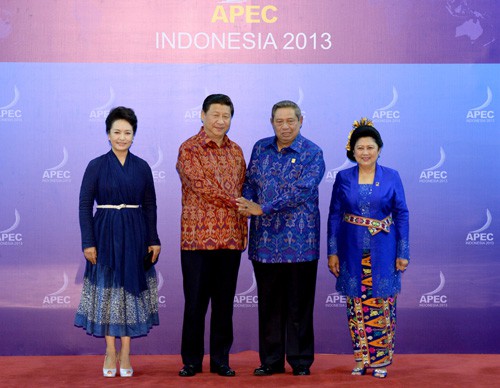|
 |
|
FIRST WIVES: Chinese President Xi Jinping (second left) and his wife Peng Liyuan (left) pose for a photo with Indonesian President Susilo Bambang Yudhoyono and his wife in Bali, Indonesia, on October 7 (MA ZHANCHENG) |
China's intensive diplomatic activities with its neighbors in recent months have captured the attention of the outside world. In just over half a year since the inauguration of new leadership, the nation's top leaders have had positive interactions with heads of state from almost all surrounding countries through reciprocal visits and dialogues. Observers remarked that the spate of exchanges was unprecedented.
A work conference focusing on China's neighborhood diplomacy was held in late October. The large scale and rare high profile of the conference, which gathered representatives from many walks of China including the economic circle, local governments and even individuals, indicate the great importance China's Central Government attaches to diplomacy in the region.
Qu Xing, President of China Institute of International Studies (CIIS), said that some sensitive issues involving China in recent years have aroused international concern. Thus, it is necessary to present an explicit explanation of China's foreign policy to its neighboring countries.
"As a top-level meeting coordinating China's diplomatic work with its neighbors, the conference worked to create a blueprint for future endeavors," said Qu.
Observers believe the recent moves regarding China's neighborhood diplomacy reflect a shift in its foreign policy. The moves are also illustrative of the new mindset of China's leadership.
Complex changes
It may be a cliché when a person comments on a situation by saying that, "It's complicated," but the phrase can certainly be applied to China's relationships with surrounding countries.
No major power—including the United States and Russia—faces a more complicated neighboring environment than China. Sharing land borders with 14 countries and six maritime neighbors, China likely has the most neighbors in the world. As each neighbor has different cultural practices, political systems as well as economic development stages, great diplomatic wisdom is needed for the Chinese Government to develop amicable relations with them all.
"Primarily, neighboring relations are of distinct significance for China due to factors such as geography, the environment and intertwined relationships," said Jin Canrong, Associate Dean of the School of International Studies at Beijing-based Renmin University. "Consolidated relations in the region are essential for China's national revival, as it is impossible to develop without a stable and sound environment."
Fostering a good-neighborly policy is the consistent principle of China's diplomacy; however, the recent intensification of China's diplomatic exchanges with neighboring countries shows that the region is undergoing profound changes.
| 